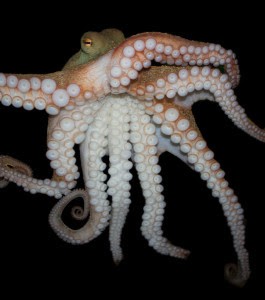Undercurrentnews
Minato-Tsukiji
By Akiyoshi Ukida, Minato-Tsukiji.com
As the weaker Japanese currency pushes up Japan’s market price of frozen fish imported from abroad, the demands of steamed or cooked octopus are increasing steadily thanks to moderate pricing.
Even though some sources explain that the consumption has slowed down slightly since mid-August, the market is now turning focus to the largest sales season coming up at year-end, as well as retail price setting for the season.
According to household spending statistics in Japan, the monthly octopus purchasing volume per household (at least two people) posted an increase of 12.5% year-on-year to 63 grams in June and 15.4% to 75g in July, turning back to positive from negative growth before.
In the background, there was a price fall on African origins since January this year through spring because of favorable catch in winter.
The local US dollar price dropped, resulting into the price decline in Japan. Retailers have put processed octopus as one of the main sales items since other seafood was all priced at high, consequently arousing the demands of octopus.
“Octopus is lined up on bargain sale items at retailers almost every week. [Pacific saury is usually a main inexpensive item for fall, but] there was no pacific saury on sales at a price below JPY 100/fish this year. Such condition worked well on octopus,” said an importer based in the Kansai (Osaka and the surrounding area) region.
Meanwhile, “the octopus consumption slightly slows down since mid-August as usual because pacific saury is now on sale”, said a processor. “Retailers reduce bargain sales of octopus in September.”
From now on, market participants go onto negotiation for the year-end sales. Especially, retail price setting would be the key for future consumption since the sales at retail stores will dominate the entire sales volume.
Japan has imported 25,970 metric tons of frozen octopus in total from Morocco and Mauritania during the first eight months of this year, up 53% y-o-y. The supply from Morocco was up 49% to 16,200t, and that from Mauritania jumped 60% to 9,800t.
However, those already arrived to Japan will be all gone to processing by the end of fall. The sales for year-end and New Year will be composed of those supplied from summer fishery.
Out of the catch by the summer fishery, Japan has already made a purchasing contract for 6,300t in Mauritania, out of which about 5,000t were caught by pot.
The on-board freezers keeps operating to the end of September, thus there will be some additional supply from them. The total supply from the summer season will be up by 6,000t supplied last year.
On the contrary, the supply from Morocco to Japan is expected to drop down sharply.
The total supply from pot and on-board freezers combined is to be 1,200-1,300t at the most or slightly over 500t at least, compared to 2,200t in the previous year. The fishery had already been over by the end of August, and there shall be no additional supply.
Due to the exchange rate, the JPY import cost of octopus from Mauritania is not at a low range. The market is now paying close attention on how much the price will be set for year-end in retailers.








